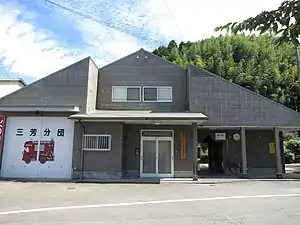Bungo-Miyoshi Station
Bungo-Miyoshi Station (豊後三芳駅, Bungo-Miyoshi-eki) is a railway station on the Kyūdai Main Line operated by JR Kyushu in Hita, Ōita Prefecture, Japan.[1][2]
Bungo-Miyoshi Station 豊後三芳駅 | |
|---|---|
 Bungo-Miyoshi Station in 2017 | |
| Location | Japan |
| Coordinates | 33°18′19.68″N 130°57′6.79″E |
| Operated by | |
| Line(s) | ■ Kyūdai Main Line |
| Distance | 49.4 km from Kurume |
| Platforms | 1 side platform |
| Tracks | 1 |
| Construction | |
| Structure type | At grade |
| Other information | |
| Status | Unstaffed |
| Website | Official website |
| History | |
| Opened | 15 November 1934 |
| Passengers | |
| FY2015 | 6 daily |
| Location | |
 Bungo-Miyoshi Station Location within Japan | |
Lines
The station is served by the Kyūdai Main Line and is located 49.4 km from the starting point of the line at Kurume.[3]
Layout
The station consists of a side platform platform a single track at grade. The unstaffed station building is a modern structure which shares facilities with the local volunteer fire brigade. A short flight of steps lead up to the platform which has a weather shelter.[2][3][4][5]
History
The private Daito Railway (大湯鉄道) had opened a track between Ōita and Onoya in 1915. The Daito Railway was nationalized in 1922, after which Japanese Government Railways (JGR) undertook phased westward expansion of the track which, at the time, it had designated as the Daito Line. By 29 September 1933, the track had reached as far west as Amagase. Separately, JGR had opened the Kyudai Main Line on 24 December 1928 with a track between Kurume and Chikugo-Yoshii and had extended the line east to Hita by 3 March 1934. On 15 November 1934, a link up was achieved between Hita and Amagase, and the entire stretch from Kurume to Ōita was now designated as the Kyudai Main Line. Bungo-Miyoshi opened on the same day as an intermediate station between Hita and Amagase. With the privatization of Japanese National Railways (JNR), the successor of JGR, on 1 April 1987, JR Kyushu took over control of the station.[6][7]
Passenger statistics
In fiscal 2015, there were a total of 2,334 boarding passengers, giving a daily average of 6 passengers.[8]
See also
References
- "JR Kyushu Route Map" (PDF). JR Kyushu. Retrieved 23 February 2018.
- "豊後三芳" [Bungo-Miyoshi]. hacchi-no-he.net. Retrieved 9 April 2018.
- Kawashima, Ryōzō (2013). 図説: 日本の鉄道 四国・九州ライン 全線・全駅・全配線・第4巻 福岡エリア [Japan Railways Illustrated. Shikoku and Kyushu. All lines, all stations, all track layouts. Volume 4 Fukuoka Area] (in Japanese). Kodansha. pp. 39, 73. ISBN 9784062951630.
- "豊後三芳" [Bungo-Miyoshi]. Retrieved 9 April 2018. Blog entry with good photographic coverage of station facilities.
- "久大本線・豊後三芳駅に行ってきました" [I went to Bungo-Miyoshi Station Kyudai Main Line]. Ameblo.jp. 21 November 2017. Retrieved 9 March 2018. Another blog entry with good photographic coverage of station facilities.
- Ishino, Tetsu; et al., eds. (1998). 停車場変遷大事典 国鉄・JR編 [Station Transition Directory - JNR/JR] (in Japanese). I. Tokyo: JTB Corporation. p. 227. ISBN 4533029809.
- Ishino, Tetsu; et al., eds. (1998). 停車場変遷大事典 国鉄・JR編 [Station Transition Directory - JNR/JR] (in Japanese). II. Tokyo: JTB Corporation. p. 40. ISBN 4533029809.
- "平成28年版 大分県統計年鑑 11 運輸および通信" [Oita Prefecture Statistics Yearbook 2016 Edition Section 11 Transportation and Communications]. Oita Prefectural Government website. Retrieved 8 April 2018. See table 128 Transport situation by individual railway stations (JR Kyushu JR Freight).
| Wikimedia Commons has media related to Bungo-Miyoshi Station. |